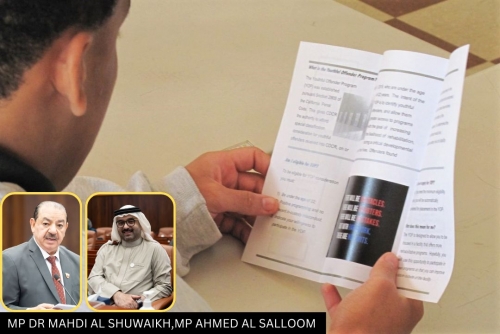Parliament approves changes to Juvenile Justice Law, hailed as ‘one of the most advanced in the region’
TDT | Manama
Email: mail@newsofbahrain.com
Young offenders in Bahrain could face internet restrictions under new judicial powers approved by Parliament yesterday, marking a shift in how courts handle youth rehabilitation.
The amendments to the Restorative Justice Law for Children and their Protection from Maltreatment will allow judges to impose bans on certain websites and online platforms as part of sentencing, alongside existing measures such as movement restrictions and home supervision orders.
These changes, tied to Decree No. (95) of 2024, also expand alternative sentencing options for serious offences and strengthen the role of the Child Protection Centre in monitoring young offenders, reducing reliance on police oversight.
Sentencing rules for serious offences would also be adjusted. At present, those convicted of a felony are bound by strict guidelines.
The changes would give judges greater discretion to assess circumstances and, where appropriate, impose alternative measures instead of custodial sentences.
Monitoring
The role of the Child Protection Centre will expand under the bill, as it takes on monitoring responsibilities alongside the Ministry of Interior, reducing the burden on law enforcement.
Courts could also refer cases to the centre for follow-up rather than relying solely on police oversight.
The shift is intended to strengthen social support mechanisms for young offenders rather than depending entirely on a police-led approach.
MP Dr Mahdi Al Shuwaikh supported the bill, describing it as “a very good law” and welcoming the expanded role of the Child Protection Centre.
“We support stronger safeguards for children, but we also urge the Education Ministry to intervene and ensure these young people continue their studies,” he said. “They need proper learning materials to help them keep up and pass their assessments.”
He also called for additional support for those who have fallen behind due to legal rulings.
“Children who have been out of school for years because of sentencing decisions should receive dedicated teaching to help them make up for lost time,” he said. MP Ahmed Al Salloom praised Bahrain’s Restorative Justice Law as “one of the most advanced in the region” and said the amendments would “strengthen the system by expanding alternative sentencing and refining judicial oversight.”
Approach
“The law already prioritises rehabilitation over punishment, but this bill reinforces that approach by allowing judges to consider alternative measures where circumstances permit,” he said.
He also backed the proposal to increase the role of the Child Protection Centre and the Ministry of Interior.
“Granting these institutions a greater role in monitoring young offenders and tracking their progress is key to making restorative justice work,” he added.
MP Jalal Kadhem also endorsed the amendments, describing them as “a real step forward in protecting children and ensuring their rehabilitation.”
Fine-tuning
“The law is still relatively new, but some provisions require fine-tuning,” he said.
The bill has undergone several reviews and secured support from key government and independent bodies.
The Ministry of Social Development has endorsed the changes, stating that they align with legal recommendations.
The Ministry of Justice said the amendments would provide courts with greater flexibility to handle cases fairly and effectively.
The Ministry of Interior has also approved the bill. The Bahrain Bar Society has raised no objections.
Related Posts

